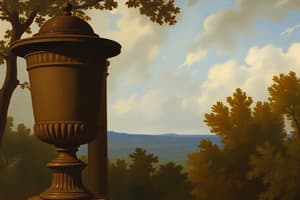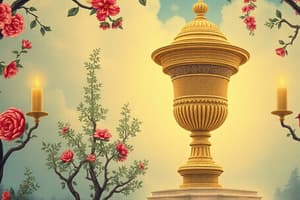Podcast
Questions and Answers
What is the contrast that Keats explores in the poem?
What is the contrast that Keats explores in the poem?
- Timelessness and impermanence (correct)
- Nature and technology
- Love and hate
- Fiction and reality
What does the urn symbolize in Keats's poem?
What does the urn symbolize in Keats's poem?
- The fragility of life
- The concept of time travel
- The importance of family
- The power of art to preserve beauty (correct)
How does Keats suggest we should treat the beauty of nature?
How does Keats suggest we should treat the beauty of nature?
- Cherish and celebrate it while it endures (correct)
- Destroy it to create something new
- Ignore it until it disappears
- Neglect it as it is fleeting
What is the enduring influence of Keats's poetry according to the text?
What is the enduring influence of Keats's poetry according to the text?
What role does art play in immortalizing beauty, as highlighted in the text?
What role does art play in immortalizing beauty, as highlighted in the text?
What invitation does Keats extend through his works, as mentioned in the text?
What invitation does Keats extend through his works, as mentioned in the text?
What is one of the central themes explored by Keats in 'Ode to a Grecian Urn'?
What is one of the central themes explored by Keats in 'Ode to a Grecian Urn'?
How does Keats portray natural beauty in 'Ode to a Grecian Urn'?
How does Keats portray natural beauty in 'Ode to a Grecian Urn'?
What does the landscape in 'Ode to a Grecian Urn' symbolize?
What does the landscape in 'Ode to a Grecian Urn' symbolize?
How does Keats perceive beauty in nature according to the text?
How does Keats perceive beauty in nature according to the text?
What emotions does the natural world evoke in Keats's poetry?
What emotions does the natural world evoke in Keats's poetry?
In 'Ode to a Grecian Urn,' why is the beauty of the natural world significant?
In 'Ode to a Grecian Urn,' why is the beauty of the natural world significant?
Flashcards
John Keats
John Keats
A 19th-century English poet known for his exploration of beauty.
Ode to a Grecian Urn
Ode to a Grecian Urn
A poem by Keats reflecting on beauty and art's immortality.
Themes of life and death
Themes of life and death
Central ideas in Keats's poetry, contrasting existence and mortality.
Natural beauty
Natural beauty
Signup and view all the flashcards
Timelessness vs. Impermanence
Timelessness vs. Impermanence
Signup and view all the flashcards
Interconnectedness of nature and humanity
Interconnectedness of nature and humanity
Signup and view all the flashcards
Art's role in immortalizing beauty
Art's role in immortalizing beauty
Signup and view all the flashcards
Frozen tableau
Frozen tableau
Signup and view all the flashcards
Beauty as a fleeting gift
Beauty as a fleeting gift
Signup and view all the flashcards
Influence of Keats's poetry
Influence of Keats's poetry
Signup and view all the flashcards
Complexities of human existence
Complexities of human existence
Signup and view all the flashcards
Reflection on beauty of nature
Reflection on beauty of nature
Signup and view all the flashcards
Study Notes
Keats and the Timeless Charm of Natural Beauty
In the realm of 19th-century English poetry, John Keats's works stand out for their profound exploration of beauty and the human spirit. One of his most celebrated poems, "Ode to a Grecian Urn," reveals Keats's contemplation on the everlasting nature of beauty, particularly in the context of natural elements. Through this poem, we delve into the subtleties of beauty in nature as portrayed by Keats.
The Ode to a Grecian Urn
"Ode to a Grecian Urn" was composed by Keats in 1819, a period of profound introspection and artistic growth. The poem is a meditation on the themes of life, death, and the significance of art, conveyed through the image of a Grecian urn. It is within this context that Keats introduces the concept of natural beauty's enduring qualities.
Beauty in Nature
Keats's poetry often depicts natural beauty as an embodiment of the divine. In "Ode to a Grecian Urn," for example, the poet marvels at the serene and tranquil scenes painted on the urn, which evoke memories of the natural world. The beauty of the forest, the fields, and the groves is immortalized in the urn's intricate carvings.
The beauty of the natural world in Keats's poetry is not merely decorative but also imbued with significance. The landscape of "Ode to a Grecian Urn" is not merely a backdrop but a vital component of the poem's narrative, highlighting the interconnectedness of nature and human existence.
Timelessness and Impermanence
One of the most prominent themes in the poem is the contrast between timelessness and impermanence. Keats juxtaposes the static imagery of the urn — scenes of life, death, and love that unfold like a frozen tableau — with the fleeting, transient nature of life itself.
This contrast heightens the importance of capturing and appreciating beauty when it is present. Keats suggests that the beauty of nature is a fleeting gift, which should be cherished and celebrated while it endures.
Art's Role in Immortalizing Beauty
The urn in the poem acts as a metaphor for the power of art to preserve and immortalize beauty. By capturing and memorializing the natural world, artists create a permanent record of their observations and experiences. In doing so, they help to ensure that beauty continues to inspire and enrich the lives of those who encounter their works.
The Enduring Influence of Keats's Poetry
Keats's exploration of beauty in nature has continued to resonate with readers long after his death. His poetry remains a timeless testament to the power of art to capture the essence of the natural world and to explore the complexities of human existence. By examining Keats's works, we can gain a deeper appreciation for the beauty of nature and its enduring influence on the human spirit.
Through "Ode to a Grecian Urn" and other works, Keats invites us to marvel at the beauty of the natural world and to reflect on the fleeting nature of life. By appreciating the beauty of nature, we can find solace and inspiration in the face of life's hardships and uncertainties. In doing so, we honor the legacy of Keats's poetry and carry forward the timeless wisdom it imparts.
Studying That Suits You
Use AI to generate personalized quizzes and flashcards to suit your learning preferences.
Description
Delve into the profound themes of beauty, timelessness, and the human spirit in John Keats's celebrated poem 'Ode to a Grecian Urn.' Explore the lasting impact of nature's beauty as portrayed in Keats's intricate verses.




